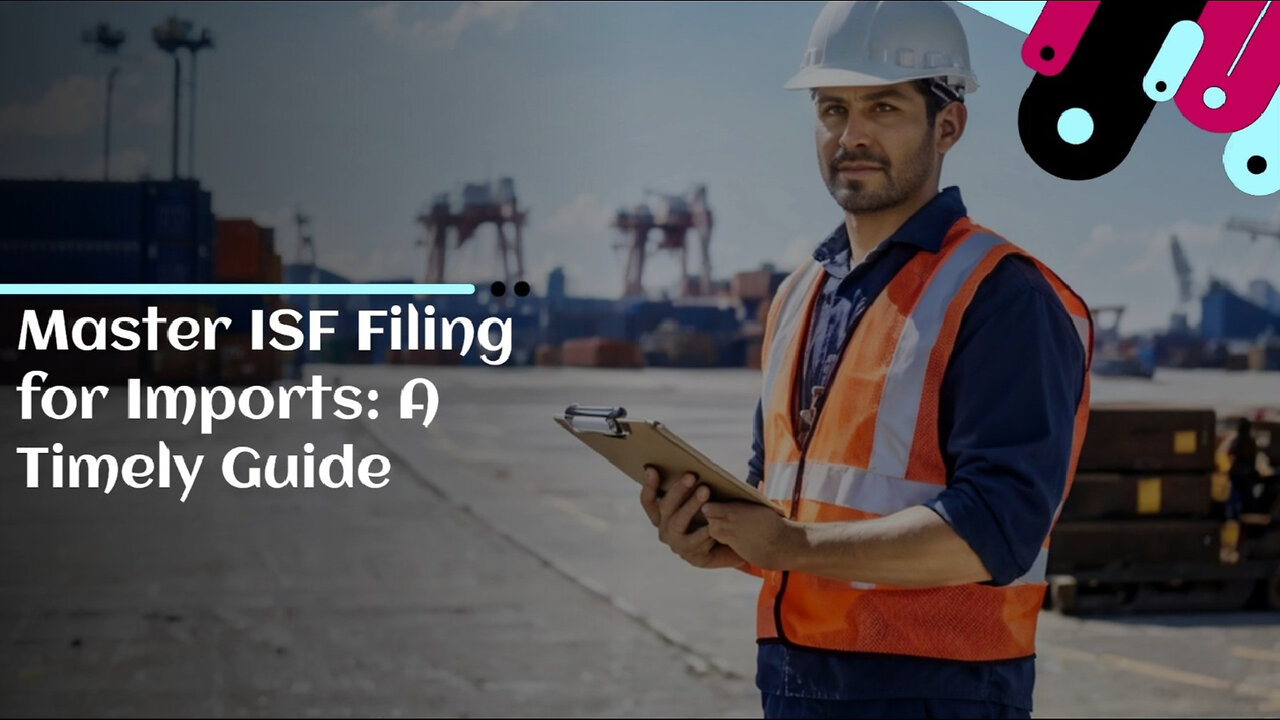Premium Only Content

Mastering ISF Filing: A Guide to Smooth Cargo Importation
ISF Template | 562-453-7357 | isf@isftemplate.com | www.isftemplate.com
n Importer Security Filing (ISF), also known as the 10+2 rule, is a requirement by the US Customs and Border Protection (CBP) for importers to provide specific information about the cargo they are importing. ISF filing is crucial for enhancing the security of the supply chain and facilitating risk assessment by customs authorities. It is important for importers to comply with ISF regulations to avoid penalties and clearance delays.
ISF filing must generally be submitted at least 24 hours prior to the cargo being loaded onto the vessel bound for the United States. However, there are exceptions depending on the mode of transportation. For example, if the cargo is being imported via land or air freight, the ISF must be filed before the cargo arrives in the United States. Understanding the specific timeline requirements based on the mode of transportation is vital to ensure compliance.
The ISF filing consists of 10 data elements provided by the importer and 2 data elements provided by the carrier. Importers must provide information such as the manufacturer, seller, consignee, buyer, ship-to party, and HTS codes. The carrier is responsible for providing the vessel stow plan and container status messages. Accuracy and completeness of the submitted information are crucial for a successful ISF filing.
Filing an ISF correctly can be complex, particularly for those new to international trade. This is where the expertise of a customs broker comes into play. Customs brokers are licensed professionals who specialize in customs regulations and procedures. They can assist importers in navigating the ISF filing process, ensuring compliance, and avoiding costly mistakes. Engaging the services of a trusted customs broker can save importers time, effort, and potential penalties.
Complying with ISF requirements brings several benefits to importers. Firstly, it helps mitigate risk by providing customs authorities with advanced information about the cargo, allowing them to identify and target high-risk shipments, ultimately improving overall supply chain security. Secondly, ISF compliance leads to smoother customs clearance processes, reducing the chances of delays and additional charges. Lastly, importers who consistently comply with ISF regulations build a reputation for trustworthiness, positively impacting their relationship with customs authorities and other stakeholders.
#usimportbond #isfcustomsbroker #uscustomsclearing #isfentry
Video Disclaimer Here: This video is designed for education and is unaffiliated with US government bodies.
00:38 - Importer Security Filing (ISF)
1:19 - When ISF Filing is Required
1:57 - Data Elements for ISF Filing
2:43 - Role of Customs Brokers
3:19 - Benefits of ISF Compliance
-
 1:15:00
1:15:00
Awaken With JP
6 hours agoMerry Christmas NOT Happy Holidays! Special - LIES Ep 71
75.8K84 -
 1:42:21
1:42:21
The Quartering
7 hours agoTrump To INVADE Mexico, Take Back Panama Canal Too! NYC Human Torch & Matt Gaetz Report Drops!
61.6K44 -
 2:23:15
2:23:15
Nerdrotic
7 hours ago $8.26 earnedA Very Merry Christmas | FNT Square Up - Nerdrotic Nooner 453
42.9K4 -
 1:14:05
1:14:05
Tucker Carlson
7 hours ago“I’ll Win With or Without You,” Teamsters Union President Reveals Kamala Harris’s Famous Last Words
122K270 -
 1:58:31
1:58:31
The Dilley Show
6 hours ago $27.24 earnedTrump Conquering Western Hemisphere? w/Author Brenden Dilley 12/23/2024
109K27 -
 1:09:59
1:09:59
Geeks + Gamers
7 hours agoSonic 3 DESTROYS Mufasa And Disney, Naughty Dog Actress SLAMS Gamers Over Intergalactic
70.5K19 -
 51:59
51:59
The Dan Bongino Show
9 hours agoDemocrat Donor Admits The Scary Truth (Ep. 2393) - 12/23/2024
739K2.38K -
 2:32:15
2:32:15
Matt Kohrs
19 hours agoRumble CEO Chris Pavlovski Talks $775M Tether Partnership || The MK Show
112K30 -
 28:23
28:23
Dave Portnoy
19 hours agoDavey Day Trader Presented by Kraken - December 23, 2024
147K40 -
 59:29
59:29
BonginoReport
10 hours agoTrump, Murder Plots, and the Christmas Miracle: Evita + Jack Posobiec (Ep.110) - 12/23/2024
154K128